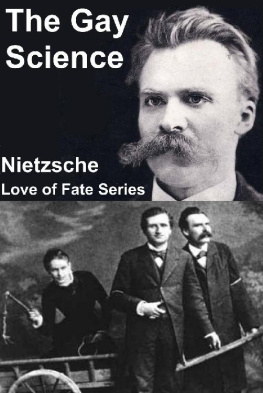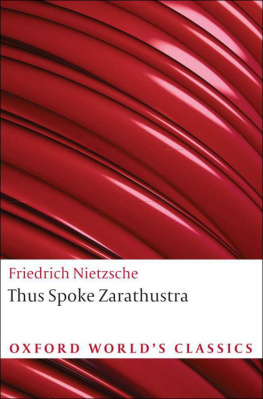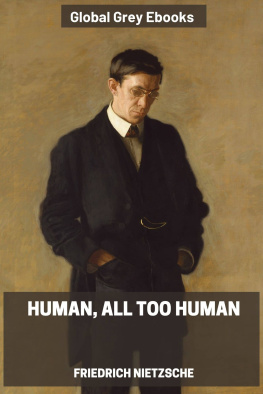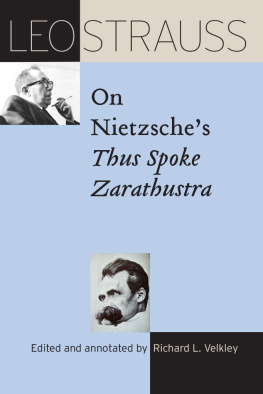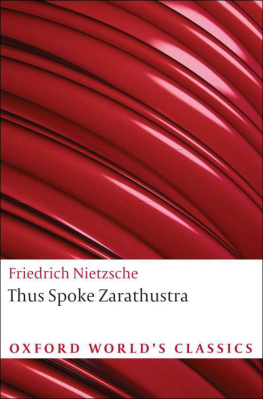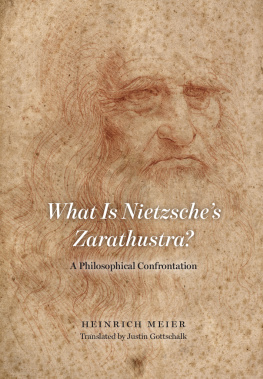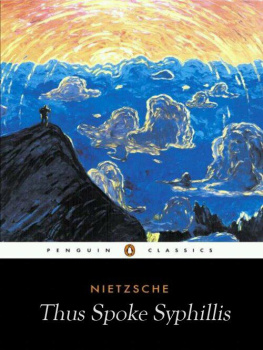
THUS SPOKE ZARATHUSTRA
F RIEDRICH N IETZSCHE was born near Leipzig in 1844, the son of a Lutheran clergyman. He attended the famous Pforta School, then went to university at Bonn and at Leipzig, where he studied philology and read Schopenhauer. When he was only twenty-four he was appointed to the chair of classical philology at Basle University; he stayed there until his health forced him into retirement in 1879. While at Basle he made and broke his friendship with Wagner, participated as an ambulance orderly in the Franco-Prussian War, and published The Birth of Tragedy (1872), Untimely Meditations (18736) and the first part of Human, All Too Human (1878; two supplements entitled Assorted Opinions and Maxims and The Wanderer and his Shadow followed in 1879 and 1880 respectively). From 1880 until his final collapse in 1889, except for brief interludes, he divorced himself from everyday life and, supported by his university pension, he lived mainly in France, Italy and Switzerland. The Dawn appeared in 1881 followed by The Gay Science in the autumn of 1882. Thus Spoke Zarathustra was written between 1883 and 1885, and his last completed books were Ecce Homo, an autobiography, and Nietzsche contra Wagner. He became insane in 1889 and remained in a condition of mental and physical paralysis until his death in 1900.
R. J. HOLLINGDALE translated eleven of Nietzsche books and published two books about him; he also translated works by, among others, Schopenhauer, Goethe, E. T. A. Hoffman, Lichtenberg and Theodor Fontane, many of these for Penguin Classics. He was the honorary president of the British Nietzsche Society. R. J. Hollingdale died on 28 September 2001. In its obituary The Times described him as Britains foremost postwar Nietzsche specialist and the Guardian paid tribute to his inspired gift for German translation. Richard Gott wrote that he brought fresh generations through fluent and intelligent translation to read and relish Nietzsches inestimable thought.
NIETZSCHE
Thus Spoke Zarathustra
A BOOK FOR EVERYONE
AND NO ONE
TRANSLATED
WITH AN INTRODUCTION BY
R. J. Hollingdale
PENGUIN BOOKS
PENGUIN BOOKS
Published by the Penguin Group
Penguin Books Ltd, 80 Strand, London WC2R 0RL, England
Penguin Putnam Inc., 375 Hudson Street, New York, New York 10014, USA
Penguin Books Australia Ltd, 250 Camberwell Road, Camberwell, Victoria 3124, Australia
Penguin Books Canada Ltd, 10 Alcorn Avenue, Toronto, Ontario, Canada M4V 3B2
Penguin Books India (P) Ltd, 11 Community Centre, Panchsheel Park, New Delhi 110 017, India
Penguin Books (NZ) Ltd, Cnr Rosedale and Airborne Roads, Albany, Auckland, New Zealand
Penguin Books (South Africa) (Pty) Ltd, 24 Sturdee Avenue, Rosebank 2196, South Africa
Penguin Books Ltd, Registered Offices: 80 Strand, London WC2R 0RL, England
www.penguin.com
This translation first published 1961
Reprinted with new Introduction 1969
Reprinted with new Chronology and Further Reading 2003
46
Copyright R. J. Hollingdale, 1961, 1969
All rights reserved
Except in the United States of America, this book is sold subject to the condition that it shall not, by way of trade or otherwise, be lent, re-sold, hired out, or otherwise circulated without the publisher prior consent in any form of binding or cover other than that in which it is published and without a similar condition including this condition being imposed on the subsequent purchaser
9780141904320
CONTENTS
CHRONOLOGY
| 1844 | 15 October. Friedrich Wilhekn Nietzsche born in the parsonage at Rocken, near Ltzen, Germany, the first of three children of Karl Ludwig, the village pastor, and Fraziska Nietzsche, daughter of the pastor of a nearby village. |
| 1849 | 27 July. Nietzsche father dies. |
| 1850 | The Nietzsche family moves to Naumberg, in Thuringia, in April. Arthur Schopenhauer publishes Essays, Aphorisms and Maxims. |
| 1856 | Birth of Freud. |
| 1858 | The family moves to No. 18 Weingarten. Nietzsche wins a place at the prestigious Pforta grammar school. |
| 1860 | Forms a literary society, Germania, with two Naumberg friends. Jacob Burckhardt publishes The Civilisation of the Renaissance in Italy. |
| 1864 | Enters Bonn University as a student of theology and philology. |
| 1865 | At Easter, Nietzsche abandons the study of theology having lost his Christian belief. Leaves Bonn for Leipzig, following his former tutor of philology, Friedrich Ritschl. Begins to read Schopenhauer. |
| 1867 | First publication, Zur Geschichte der Theognideischen Spruchsammlung (The History of the Theognidia Collection) in the Rheinische Museum fir Philiogie. Begins military service. |
| 1868 | Discharged from the army. Meets Richard Wagner. |
| 1869 | Appointed to the chair of classical philology at Basle University having been recommended by Ritschl. Awarded a doctorate by Leipzig. Regular visitor at Wagners home in Tribschen. |
| 1870 | Delivers public lectures on The Greek Music Drama and Socrates and Tragedy. Serves as a medical orderly with the Prussian army where he is taken ill with diphtheria. |
| 1871 | Applies unsuccessfully for the chair of philology at Basle. His health deteriorates. Takes leave to recover and works on The Birth of Tragedy. |
| 1872 | The Birth of Tragedy published (January). Public lectures On the Future of our Educational Institutions. |
| 1873 | Untimely Meditations I: David Strauss published. |
| 1874 | Untimely Meditations II: On the Use and Disadvantage of History for Life and III: Schopenhauer as Educator published. |
| 1875 | Meets Peter Gast, who is to become his earliest disciple. Suffers from ill-health leading to a general collapse at Christmas. |
| 1876 | Granted a long absence from Basle due to continuing ill-health. Proposes marriage to Mathilde Trampedach but is rejected. Untimely Meditations IV: Richard Wagner in Bayreuth published. Travels to Italy. |
| 1878 | Human, All Too Human published. His friendship with the Wagners comes to an end. |
| 1879 | Assorted Opinions and Maxims published. Retires on a pension from Basle due to sickness. |
| 1880 | The Wanderer and his Shadow and Human, All Too Human II published. |
| 1881 | Dawn published. |
| 1882 | The Gay Science published. Proposes to Lou Andreas Salome and is rejected. |
| 1883 | 13 February. Wagner dies in Venice. Thus Spoke Zarathustra I and II published. |
| 1884 | Thus Spoke Zarathustra HI published. |
| 1885 | Zarathustra IV privately printed. |
| 1886 | Beyond Good and Evil published. |
| 1887 | On the Genealogy of Morals published. |
| 1888 | The Wagner Case published. First review of his work as a whole published in the Bern Bund. Experiences some improvement in health but this is short-lived. |
| 1889 | Suffers mental collapse in Turin and is admitted to a psychiatric clinic at the University of Jena. |


